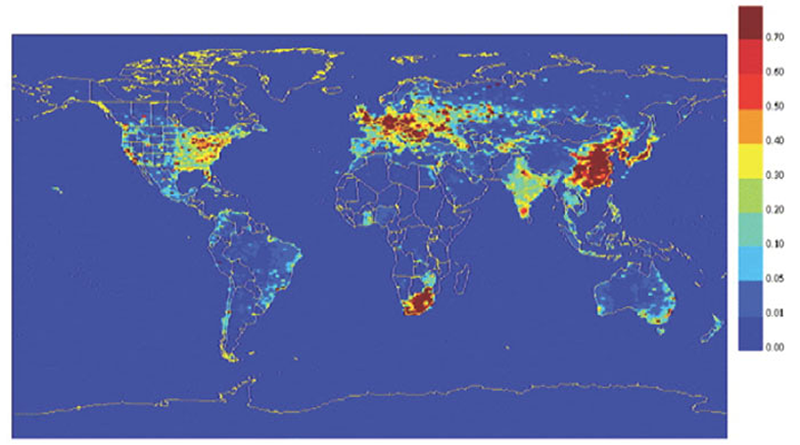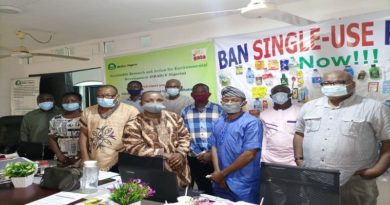Study raises concern on mercury hotspots in Nigeria, seek govt ratification
A recent study conducted by a Non-Governmental Organization to determine the level of mercury in selected cities namely Lagos, Ibadan in Oyo State and Abuja, the Federal Capital Territory has revealed three major hotspots of the substance.
The study, mercury level in selected hotspots in Nigeria-Lumex project- carried out by a Non-Governmental Organisation, Sustainable Research and Action for Environmental Development (SRADev Nigeria) concluded most dental clinics/hospitals- still using amalgam and incinerators/medical waste treatment facilities in Nigeria are very high risk environments for mercury vapour emissions and as such pose serious health risk to workers and the general public.
Due to health risks, environmental impacts, the need for information and the regulation of mercury led the United Nations Environment Programme Governing Council (UNEP GC) decisions to start developing a global binding instrument on mercury in 2009, leading to legally binding treat on mercury in 2013.
Although Nigeria became a signatory to the convention in October 2013, no comprehensive national law on mercury management exist in the country.
Giving an overview of the project at a workshop penultimate weekend in Lagos, Executive Director of STRADev, Mr. Leslie Adogame, stressed that despite the risks due to mercury, Africans have very low awareness of the toxic substance which is used in soap, cosmetics, antiseptics, paints, pesticides, pharmaceutical products, human veterinary products and even in dental fixtures.
According to him, in Nigeria, northern states of the nation experienced deaths of over 500 children from Artisanal Small-scale Gold Mining (ASGM) mercury activities linked with lead poisoning.
On national action, Adogame noted that past efforts related to the chemicals content in products have typically focused on known hazards. But the case of mercury is a chemical already in widespread use which was found to have harmful effects.
He went further, “There is need for information to understand the risks and how to control mercury at different stages in a product’s life, from design and manufacturing via use, possibly recycling and ultimate waste disposal.
“The text for the future Minamata Convention on Mercury was agreed to on 19 January 2013, in Geneva. The diplomatic conference (Dip Con) where the treaty was adopted and opened for signature took place in Japan in October 2013.
“Nigeria became a signatory to the convention on 10 October 2013. To-date, the convention has already been signed by 100 countries.The phase-out date for all of these products is 2020.
“A country can register for one or more exemptions to the phase out dates. The exemption will expire 5 years after the phase out date,” he said.
On the Lumex project, he said it was observed from the study that many of the dental clinics lack proper ventilation within the facility which prevent the escape of mercury vapor thus high concentration also inappropriate handling of mercury/mercury amalgam, mercury containing wastes, lack of awareness regarding health hazards of mercury to human health and its impact on the environment.
Parts of the recommendations of the study was the need for government to discourage insurance policies and programmes that favour dental amalgam over mercury-free alternative for dental restoration; promoting mercury-free alternative restoration; promulgation of mercury specific legislation, including national emissions/releases standards that should be formulated and made available to public and that media publicity should be made available through the television, radio, street electronic billboards etc.
Speaking on the legal regime for the handling of mercury and mercury products in Nigeria- an assessment of gaps in chemical management in Nigeria vis-à-vis the Minamata Convention on mercury, Mr. Eugene Itua, said one of the gaps identified was lack of awareness by Nigerian women who are the mostly affected.
He disclosed that most individuals have very low awareness of this toxic substance and generally, laws and regulations on chemical management in Nigeria and laws on mercury in particular are fragmented and or do not meet the requirements to handle issues involving chemicals and mercury.
Of particular interest in the gaps that need to be addressed according to him are the issues of responsible mercury and chemical waste treatment and issues of storage and disposal of items that contain mercury, including waste minimization through extensive reuse and recycling as key components of Sound Chemical Management.
“Nigeria will need to keep step with best practices by strengthening its laws to provide customers instructions for proper disposal on Safety Data Sheets (SDSs) and other materials. A typical example is how to dispose of electronic junk through methods of disposal that do not distribute mercury into the atmosphere. All the chemical legislations in Nigeria deal with the trade and use mercury only generally. Thus most of the information based on scientific discoveries made by the international scientific community in the last decade about the dangerous and harmful effects of exposure to mercury has not been brought with the purview of any national chemicals legislation,” he said.
Itua proposed streamlining of disposal of seized goods in the country by agents of the government to prevent pollution of the environment through release of hazardous substances when such goods are been burn or buried in the ground.
Member, Friends of the Earth, Mr. Chike Chikwendu, an engineer, commended the out come of the study, saying “it is a project we need to talk about because of the arm mercury can do to our health and environment”.
He stressed the need for more awareness among the citizenry, adding that the current awareness is too low.




